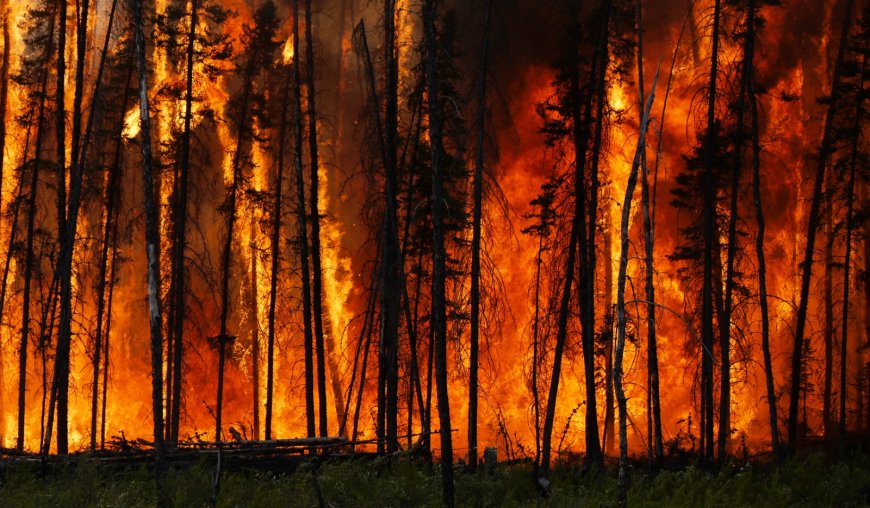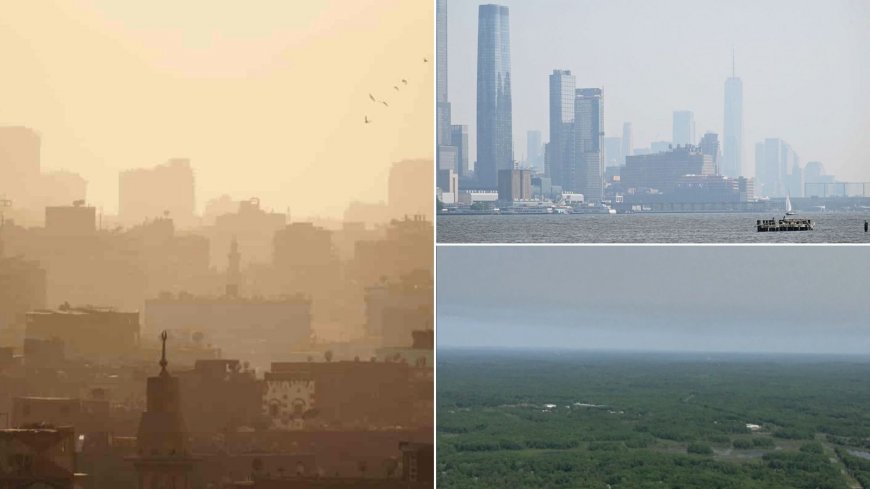Environmental catastrophe knows no borders, spares none
Canadian wildfire is affecting air quality in US Northeast

Representative image
A forest fire
Environmental disasters have the potential to overrun national boundaries. Yet the world refuses to unite in combating climatic threats. Mankind has divided the planet into countries and nations, but when nature unleashes its fury then most of us have to suffer together. Borders prove to be fragile barriers.
The latest manifestation of the horrific phenomenon appears in the form of the wildfires in Halifax municipal region in Canada’s Nova Scotia province. The forest fires broke out on May 28.
According to media reports, more than 16,000 people had to be evacuated “upending peoples’ lives”. TV coverage of downtown Halifax late Sunday showed a dense plume of smoke enveloping the city, the sun an apocalyptic red, as a fire northwest of the city raged, spreading the smoke. The blaze started in an area that is home to many suburban professionals and families.
Wildfires have broken out throughout western Canada, including British Columbia, and the hardest hit has been Alberta, an oil- and gas-producing province. Climate research suggests that heat and drought associated with global warming are major reasons for bigger and stronger fires.
In Nova Scotia, there have been 195 wildfires so far this year compared with 153 in all of 2022. But officials said the blazes had intensified this year.
The US invaded
The smoke and haze generated by these fires are now impacting air quality in the US Northeast, specifically in areas like New Jersey and southeastern Pennsylvania, including Philadelphia. Recognizing the cross-border consequences of environmental disasters is crucial for fostering international cooperation and implementing measures to mitigate their effects.
The smoke and haze from the wildfires in Nova Scotia continue to drift into the US Northeast, enveloping the region in a cloud of pollution. As a result, air quality alerts have been issued for several areas, including Philadelphia and its surrounding regions. The National Weather Service has declared a Code Orange air quality alert for these areas, warning that pollution levels may become harmful, particularly for vulnerable groups such as the elderly and young children. It is essential for these individuals to limit their outdoor activities and avoid strenuous exertion to safeguard their health.

Smog engulfs US cities
The smoke and fine particulate matter emitted by the Canadian wildfires pose a significant threat to air quality in the US Northeast. These microscopic particles, with a diameter smaller than 2.5 microns, have the ability to penetrate deep into the lungs, exacerbating respiratory conditions like asthma. While the smoke remains close to the ground, the affected areas will experience prolonged periods with elevated concentrations of these fine particles.
The wildfires in Nova Scotia, occurring amid record-breaking heatwaves, have resulted in widespread devastation, spanning over 25,000 acres and destroying numerous structures. The effects of these fires are not limited to Canada alone; the smoke has reached Cape Cod and is expected to spread further north and west as the winds shift direction. The intensity of the fires has prompted the evacuation of thousands of residents and the closure of wooded areas, parks, and trails in the affected regions. The destruction caused by the fires serves as a reminder of the socio-economic impacts that environmental disasters can have on communities, both locally and across borders.
Efforts to control and mitigate the spread of wildfires in Nova Scotia are under way, but the lack of rainfall in the area has posed challenges to containment. The urgent need for precipitation is emphasized by officials, who acknowledge the increasing risk of the fires spreading rapidly. Moreover, the province-wide burn ban highlights the importance of responsible behaviour and the avoidance of any activities that may spark additional fires. The strained resources and firefighting efforts necessitate adherence to safety regulations and the cessation of practices that could further exacerbate the situation.
Those who live under the illusion that the blaze in the neighbourhood will leave their hearth and home unharmed are harbouring a hazardous fallacy. Collaborative efforts, including sharing resources, expertise, and preventive measures, are essential in effectively managing cross-border environmental crises. By recognizing the far-reaching implications and taking collective action, we can work towards minimizing the adverse effects and promoting a sustainable future for all. As the ancient Sanskrit saying goes: Vasudhaiv kutumbkam (the world is one family).
What's Your Reaction?













































